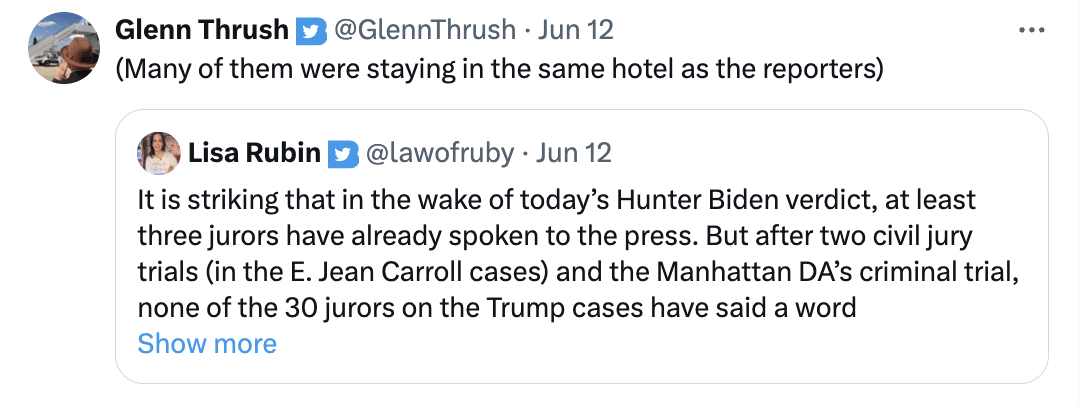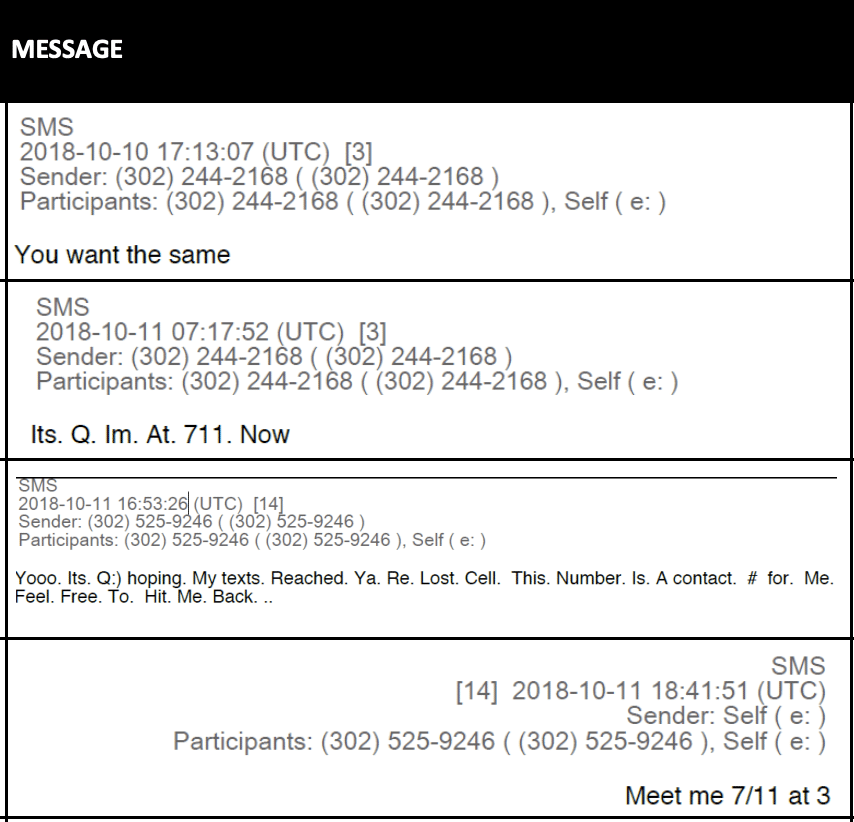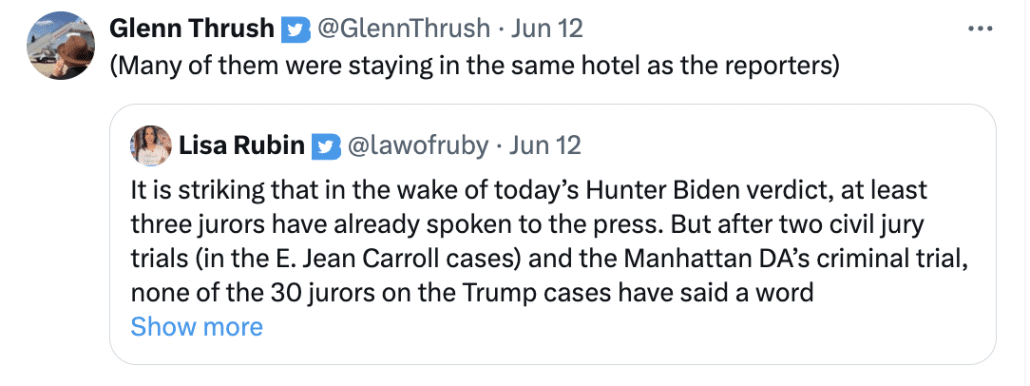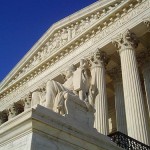The Pee Tape: The Media’s Obsession with Jill Biden May Undermine the Jury
Let say at the outset, I absolutely support the decision of the jury to convict Hunter Biden, based on the evidence submitted to them.
This description, from Juror 10, describes that Abbe Lowell’s attempt to explain away the 7-Eleven texts sprung on the defense the morning of closing arguments convinced the jury that Hunter had been trying to buy crack shortly before he denied being an addict on the gun form.
The 68-year-old juror from Sussex County, Delaware described the case to Fox News but said he didn’t buy the defense’s narrative that Hunter may have gone to a 7-Eleven to buy coffee — and said he thought he was probably buying crack-cocaine.
“Nobody is above the law, doesn’t matter who you are,” the juror said.
Prosecutors had suggested that Biden was trying to reach out and find drug dealers when he was arranging to meet someone at a Wilmington convenience store at 5 a.m. 7-Eleven was referenced in Biden’s Oct. 15-16, 2018, text messages. Biden also wrote about the convenience store in his memoir, “Beautiful Things,” explaining it was the type of place he would go to buy drugs.
That would suggest any question about the verdict would focus more on the way the prosecution submitted these texts, without identifying them as exhibits first, as a rebuttal case.
As zscoreUSA and I were discussing when I described the background of the texts, by submitting them in this way, Abbe Lowell had no opportunity to conduct a technical review of how those SMS texts, probably sent from a phone that Hunter lost the day he sent them, came to be found on a laptop that didn’t first associate to Hunter Biden’s iCloud account for another ten days. (He may later have found the phone, but this particular instance is a case that prosecutors would need to explain.)
So admitting them in this way did two things: Admitted case-in-chief evidence as rebuttal evidence, even though it had no plausible tie to rebutting Naomi Biden’s testimony, the pretext prosecutors used for doing so, and in so doing, depriving Lowell of making a technical challenge to their admission.
As I said before those texts came in, the case that Hunter used drugs during the period he owned the gun was strong. That made the decision on Count Three, possession, fairly clear cut. Short of nullification, the biggest question was whether jurors would find the sketchiness surrounding the form raised enough questions about it to give pause on the two form-related charges. Apparently it did: according to one report the last thing the jury decided was whether the form could be deemed material in a case where the gun shop admitted they sold the gun even though the paperwork was improper.
But once those 7-Eleven texts came in, it made any attempt to explain mindset at the gun shop far less convincing. As Lowell said, the texts were “case changing.”
So any question about the verdict will focus not on the jury, but on five decisions Noreika made:
- To permit the prosecution to rely on laptop evidence without indexing and Bates stamping it first
- To admit laptop evidence via summary, evading any technical validation
- To prohibit virtually all discussion of the gun shop’s own alleged misconduct with respect to the form
- To allow prosecutors to admit these texts as rebuttal, when they should have come in — as identified exhibits — in their case in chief
- To keep “knowingly” off the verdict form
Again, with regards to the substance of the evidence, all of the many juror interviews demonstrate that the verdict was proper. I’m grateful for their service and happy that they’re not terrified of being doxxed, as all the Trump jurors (wisely) appear to be.
That said, the media’s obsession on whether Jill Biden’s presence in the courtroom played a factor — a question they seemed to ask every time a juror gave an interview — could undermine the jury in another way, because it introduces questions of juror credibility and raises further questions about their discussions before deliberating.
That’s because this tweet from Glenn Thrush suggests that jurors and the media were, at a minimum, aware of, if not interacting with, each other as they all stayed at the Doubletree Hotel next to the courthouse.
Juror 10, who lives an hour away from the courthouse, is among those who might have stayed at the hotel.
The jurors all promised they would keep an open mind. But there wasn’t a single journalist at the trial who exhibited an open mind — and almost none of them exhibited an understanding of the elements of offense for each of the three charges. Almost none of them understood that the four years of evidence of addiction was not dispositive about Hunter’s mindset on October 12, 2018.
The jurors were much smarter about the case than the tabloid journalists covering it. So even if jurors just heard reporters discussing the case at breakfast or the hotel bar, it might taint their understanding of the case (though Judge Noreika asked jurors Tuesday morning and they said they had not “[heard] anything” outside of the courtroom).
All the more so given that jurors went from a 6-6 split on the verdict on Monday to coming to unanimity after a few hours on Tuesday.
Because of the import of the 7-Eleven texts, any such taint likely wouldn’t matter.
But there is something that jurors have said that might raise questions.
Because the press asked and asked and asked about Jill Biden’s presence, there are many descriptions of how the jury viewed her presence, such as this claim from the ubiquitous Juror 10.
Some jurors confessed that they didn’t initially recognize the first lady, who was a constant figure sitting behind Hunter Biden in the courtroom gallery.
“People were saying, ‘I didn’t even know what President Biden’s wife looked like,’” juror No. 10 said, adding that he felt badly that Hunter Biden’s daughter, Naomi Biden, was called to testify.
Juror 10 balked at that same question here.
CNN, however, said that all the jurors it spoke with “acknowledged the weight of having her in the courtroom,” (with yet another quote from Juror 10).
The reason this matters is that one juror and two alternates ran into Jill Biden and Melissa Cohen Biden last Wednesday when they decided to use the public bathroom rather than the dedicated jurors’ bathrooms.
THE COURT: So during the break, three jurors decided that they didn’t want to wait in line in the jury room because there are 16 of them and one bathroom or two, and so they went out in the hall and they went to the bathroom. It was juror number nine, and it was two of the alternates, I believe it was the remaining — the first two remaining alternates, not the older woman on the —
MR. KOLANSKY: Younger woman.
THE COURT: Yes, the two younger women. And so they went to the bathroom and the Marshal saw them in there and came back. Mr. Biden’s wife was in there at the time. And she was in the stall, and she was coming out of the stall when they were — when they were — I guess washing their hands or something.
So I instructed my deputy that he needs to be much sterner that they — with all the jury, that they cannot leave unaccompanied. I then called in each of the jurors one at a time into my chambers to reinforce that, but also to ask them what happened.
They each gave very similar stories. They said you know, didn’t want to wait in line, they opened the door from my chambers, there is a hallway back here, my chambers is on the other side, so they walked down this hallway, got to the door, and they saw security. I assume it was Secret Service, because I think Mrs. Biden stands out there. They said they waited and someone gave them a thumbs up and they walked to the bathroom, went to the bathroom, were coming out and as they were coming out, they saw Mrs. Biden, the younger Mrs. Biden, coming out of the stall. That there were no — there was no discussion, no interaction, but they saw her, and then one of the jurors said when it was — one of the alternates, she said when she was walking back, she looked sideways, and saw the first lady, that one didn’t bother me because you can see the first lady sitting in the courtroom. That’s what happened, if you guys want to do anything, if you want to ask them any questions you can, but I just want to put on the record that happened.
MR. LOWELL: Appreciate you telling us that, there was no verbal interaction?
THE COURT: There was no verbal interaction, were you guys discussing anything you’re not supposed to be discussing about the case, were you discussing anything in the bathroom?
MR. LOWELL: There is nothing I need to say.
THE COURT: No, she didn’t do anything wrong.
MR. LOWELL: She just went to the bathroom?
MR. HINES: Today?
MR. LOWELL: Right. I understand.
Getting questioned — without warning to the lawyers in advance — about this interchange changed the focus on Jill Biden.
We know, from the sidebar on Hallie Biden’s interactions with her spouse, that jurors were discussing interactions with family members when they shouldn’t have been. Indeed, one of the alternate jurors was the one who first raised the exchanges Hallie Biden was having from the witness stand.
And Juror 10’s chummy interviews with the press raises questions about discussion of Jill Biden’s presence, possibly in response to this exchange.







So is this a double whammy of having Naomi testify?
One whammy is that she testified to Hunter’s unreachable-ness as an indicator of his addiction which led to inference of drug usage in NY.
Then these crucial 7-11 texts arranging drug deals were allowed in.
The bigger whammy was that she provided circumstantial proof that between the 19th and the 23rd Hunter had used drugs, based on presence of crack scraps in the truck.
But yes, also that they claimed they needed to disprove her assent of Abbe Lowell’s mistake by introducing texts from 5 days earlier.
First part, Norieka – in addition to evidence decisions, also there will be jury instruction decisions examined by Lowell’s team as a defense basis to appeal.
I am curious there was no question of the salesman dealing with Biden whether he was on straight salary or commission in whole or part. If he had a pecuniary interest in closing a sale, with paperwork in the way rather than a help, that might have been a consideration. If asked, my gut says an objection would have been sustained — too remote and arguably more prejudicial than probative. But it fits into sloppy paperwork but there being a live sale, not a foreclosed one. Cash flowed. Paperwork secondary.
I cannot point out exactly any EW posted text, but it seems Hunter futzed around the shop with the salesman approaching him and upselling him to the high profit inventory.
Keeping “knowingly” off the verdict form: Norieka was a patent and intellectual property litigator before being appointed. In Delaware, long the favored incorporation state. That’s an area where special verdict forms gain much attention and use. That background, here a vanilla verdict form, it might be the strongest trial based appeals issue. Especially if jury instructions did not sufficiently stress state of mind as an element. Pretrial, the aborted plea contract looms large.
https://www.cbsnews.com/news/judge-maryellen-noreika-hunter-biden-plea-deal/ — re mention of patent practice.
For special verdict form common usage in patent litigation; at Sect. 8.5.4
https://www.law.berkeley.edu/wp-content/uploads/2016/05/Chapter-8-Final.pdf
Otherwise that would have been a bald assertion.
In searching today I came across this. I had not seen that preliminary to a plea hearing an “amicus” Republican congressional item was submitted. Isn’t leave of court needed to file an amicus item, when properly in preceedings, and “amicus” stuff at the plea hearing stage seems a patent showing of intentional political interference, an intended thumb on the scale?
https://www.cnn.com/2023/07/25/politics/hunter-biden-house-republicans-amicus-brief/index.html
Also, Norieka contributed whenever she could against the Obama-Biden ticket. https://www.cnn.com/2023/06/21/politics/hunter-biden-judge-maryellen-noreika/index.html
She most certainly can donate politically to anyone she chooses, there is no bar to that; but in the “court of public opinion” it is evidence.
Add that she’d been in ex parte communication previously with prosecutors on a grand jury matter, having that early ex parte input on FARA being a part of the investigation, but not expressly mentioned in plea contract papers.
She had discretion, but it all looks unclean when political reality required more than ordinary cursory discretion. Yet more wierd angles to this case from the start.
Do any of the criminal practictioners see this as normal harmless error, if error at all?
After she became a judge, political contributions to any party or politician would be inconsistent with the judicial code of ethics.
I was unnerved at how quickly the jury went from 6-6 to a unanimous finding of guilty on all charges. But now, thanks to emptywheel, I have a much better understanding of the role jury instruction plays. That is very helpful.
Being in a courtroom was incredibly disorienting for me as a plaintiff and witness. So many things were happening at the same time. I did notice many sidebars, but I had no comprehension of what anything meant.
In my case, I also noticed some inappropriate behavior on the part of a juror and witness. And I thought the judge misinformed at least once. But I hadn’t given any thought to evidence. I just took it for granted that jurors would see and consider what I knew was valuable information. I later learned I was wrong.
So, it will be very interesting to see how the five decisions Noreika made will play out. They seem substantive to me relative to an appeal.
I also want to mention that this comment by Juror 10 came across to me as potentially coercive:
“Nobody is above the law, doesn’t matter who you are,” the juror said.
It made me wonder if that played any untoward part in deliberations, especially since there were the interactions with Jill and Melissa Biden and the media communications.
That line from Juror 10 about “nobody” being above the law struck me as odd, too. It has an anomalous ring in this context, with a defendant who has very much not been filing novelty pleadings claiming himself immune to any prosecution–a defendant without a tame SCOTUS *or* a dad eager to pardon him out of his troubles.
It suggests that Juror 10 (and perhaps others) are arguing against a larger perceived force than Hunter Biden.